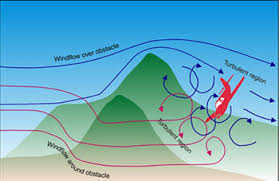What are the air turbulence
Arab Weather - Air turbulence is something that must happen on most flights, and it may vary in severity and disruption to the plane, but it remains a source of concern for many travelers, and to reduce this anxiety, one must first understand the causes of air turbulence, the places in which they occur, and know the methods The technology that pilots use to make flights safer and more comfortable for travelers.
Definition of turbulence
Known air bumps or air bumps (English: Air Turbulence) as air vortexes turbulent occur in the atmosphere, and vary in intensity from place to place and from time to time, and feel the plane 's passengers bumpy air through what is caused by these bumps from the vibrations of the fuselage, and bumps occur Weather at different altitudes from the surface of the earth, as it can be found near the surface of the earth and not only at high altitudes, and the movement of vertical or horizontal winds can cause weather bumps.
Types of turbulence and their causes
The following are the types of turbulence, depending on the most common cause:
1. Air bumps resulting from the mountains ( in English: Orographic Turbulence): differs from the behavior of air currents when faced with the mountains, but the area of occurrence of bumps air are after crossing the air currents of the mountain, where the mountain barrier of air traffic, causing the disintegration of air currents to many waves Turbulent, which causes turbulence for aircraft entering the turbulence zone.

2. Jetstream Turbulence : Jet streams are fast wind currents with relatively narrow bands and quasi-horizontal, located in or near the troposphere of the atmosphere, and these currents cause air turbulence due to the sudden difference in wind speeds. Wind Shear at the edges of the jet stream, causing severe turbulence and turbulence.
3. Thunderstorms : Thunderstorms cause air turbulence to air several kilometers away. The rapid growth of thunderstorms pushes the air away, leading to turbulence in the atmosphere hundreds of miles away.
Predicting weather turbulence
Sudden air turbulence is often the culprit behind moderate to severe injuries among passengers and crew, so that flight crew does not have time to direct passengers to seatbelts, according to the Federal Aviation Administration, 524 passengers and flight crew were reported injured due to bumps Weather between 2002 - 2017, some weather turbulence is difficult to predict.
Although weather forecasts provide information on where the turbulence occurs, the accuracy of the gauges is not perfect. Weather models cannot predict atmospheric turbulence on a small scale by the size of an aircraft, and pilots often mistake locations for turbulence by several dozen. From miles, but work is ongoing to build more accurate tools for real-time turbulence prediction.
These tools work using an algorithm that analyzes information from sensors on the plane to characterize the movement of each aircraft at any given moment, using data about forward speed, wind speed, air pressure, roll angle and other factors, and these tools are used in conjunction with national weather models and forecasts. They clarify the actual forecast as the aircraft is in motion, which in turn helps to reinforce the weather forecast models.
Arabia Weather App
Download the app to receive weather notifications and more..



